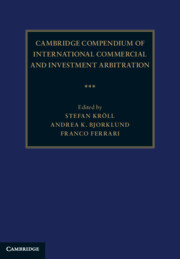Book contents
- Cambridge Compendium of International Commercial and Investment Arbitration
- Cambridge Compendium of International Commercial and Investment Arbitration
- Copyright page
- Contents
- Figures
- Tables
- Contributors
- Preface
- Part I Foundations
- Part II Public Law Questions Relating to Arbitration
- Part III Stakeholders in Arbitration
- Part IV Applicable Law
- Part V Jurisdiction of the Arbitrator
- Part VI The Arbitral Tribunal
- Part VII Procedural Questions in Arbitration
- Part VIII Role of State Courts in Arbitration
- Part IX Awards
- Part X Post-Award Issues
- Part XI Legal Concepts
- Part XII Areas of Concern
- Part XIII Arbitration and Related Fields
- 61 The Promise and Peril of Empiricism and International Investment Law Disputes
- 62 Sociology of Arbitrators
- 63 Economic Analysis of Arbitration
- 64 Teaching Arbitration
- Part XIV EU Law and Arbitration
61 - The Promise and Peril of Empiricism and International Investment Law Disputes
from Part XIII - Arbitration and Related Fields
Published online by Cambridge University Press: 18 February 2023
- Cambridge Compendium of International Commercial and Investment Arbitration
- Cambridge Compendium of International Commercial and Investment Arbitration
- Copyright page
- Contents
- Figures
- Tables
- Contributors
- Preface
- Part I Foundations
- Part II Public Law Questions Relating to Arbitration
- Part III Stakeholders in Arbitration
- Part IV Applicable Law
- Part V Jurisdiction of the Arbitrator
- Part VI The Arbitral Tribunal
- Part VII Procedural Questions in Arbitration
- Part VIII Role of State Courts in Arbitration
- Part IX Awards
- Part X Post-Award Issues
- Part XI Legal Concepts
- Part XII Areas of Concern
- Part XIII Arbitration and Related Fields
- 61 The Promise and Peril of Empiricism and International Investment Law Disputes
- 62 Sociology of Arbitrators
- 63 Economic Analysis of Arbitration
- 64 Teaching Arbitration
- Part XIV EU Law and Arbitration
Summary
Empirical research into investment treaty conflict is simultaneously promising and potentially perilous. This chapter identifies both its costs and benefits while striving to provide a clear set of guidelines for quality research in an effort to identify the potential uses and abuses of empiricism in international investment law.Empirical research is not immune from the polarization within the field, but certain steps can ensure that empirical work is not influenced by narrow or ideological perspectives. First, we need to understand norms of quality social science to enable a data-driven, rather than emotive, conversation. Second, we need to create time and space for balanced contemplation that cuts across ideological groupings – rather than having conferences and events attended by one selected segment – and ensuring that alternative perspectives are welcomed. Third, we need to work on developing empathic dialogue to engage productively about empirical research and normative reform, including focusing upon aspects that are valuable and those that require development. The objective should be to organize conversations about international investment law around data to engage productively, so that reason and intuition can interact to create solutions that are constructive and sustainable for the longer term.
Keywords
- Type
- Chapter
- Information
- Publisher: Cambridge University PressPrint publication year: 2023

